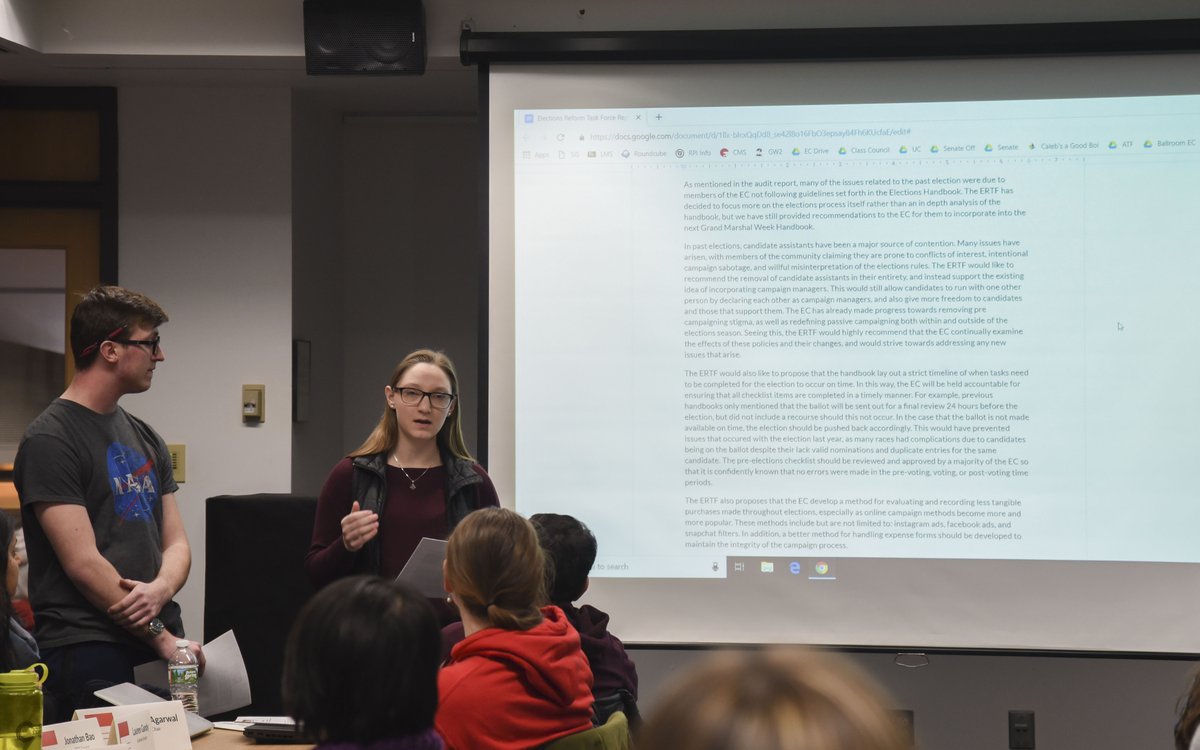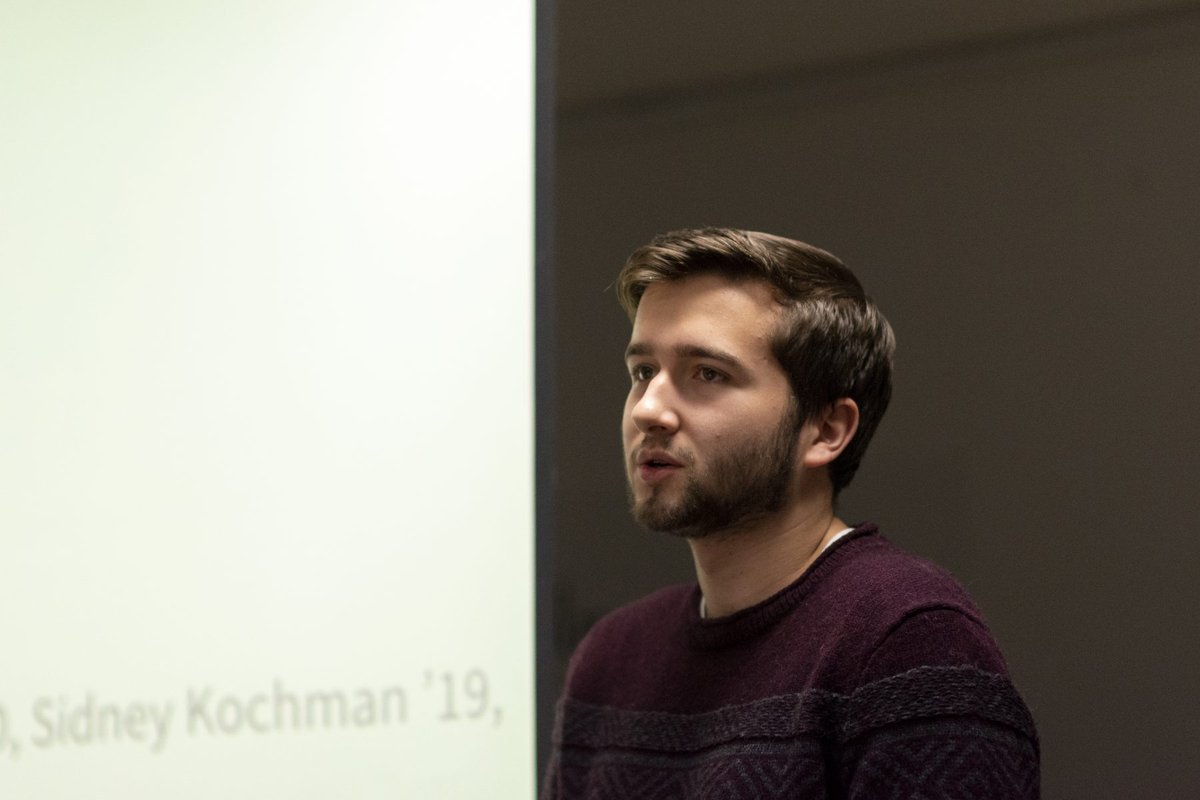Elections Reform Task Force presents recommendations for future elections

Grand Marshal Stef Warner ’19 and Elections Commission Chairperson Zachary Taylor ’21 presented The Elections Reform Task Force Report—a culmination of recommendations regarding the GM Week 2018 elections—on January 14.
The Elections Reform Task Force, also known as the ERTF, was formed on May 2 with the primary purpose of “identifying and addressing the issues that we saw during this past election cycle,” as explained by Warner in a Top Hat last year. The motion to create the task force said that it “shall fulfill its purpose and present to the Student Senate, in the form of a report and resolution, its recommendations by no later than December 31, 2018.” The Elections Reform Task Force Report was emailed to the Senate’s mailing list on December 31, but a resolution has not been released or voted on. Warner said that she is “hoping we can have a resolution presented to the Senate by next week.”
Some of the main issues with the GM Week 2018 elections were detailed in a decision from the Judicial Board, and included “problems with the ballots,” that the “voting system [was] compromised,” that “results [were] released a day beforehand,” and that student identification was not consistently checked at polling sites. Problems with the ballots stemmed from the Commission’s failure to prepare it 24 hours in advance—a violation of the GM Week 2018 Elections Handbook—which resulted in omitted amendments, delayed voting, the addition of ineligible candidates on the ballot, and duplicate names.
Other issues included the falsification of a vote on a sanction by former Elections Commission Chairperson Caleb Caraway ’19; excessive wait times for students voting; and election candidates poll sitting, and therefore introducing bias.
Some of the recommendations in the ERTF report explicitly address the aforementioned problems. The task force recommends continued use of the Rensselaer Union Voting System, if changes can be made to “better secure and strengthen the existing code.” If RUVS is not “suitable for this upcoming election for a substantial reason,” the use of paper ballots is recommended. To prevent “issues whereby an individual tampers with the vote totals or results,” the ERTF recommends that “multiple groups and databases receive the results of voting.” To hold the Commission accountable for violations to the handbook—such as not sending out a ballot 24 hours in advance—the ERTF suggests that “the election should be pushed back accordingly.” To combat candidates influencing elections at the voting sites, the task force recommends that Commission members wear “an identifying article” so that concerns could “more easily be addressed to those in charge of impartially handling the elections.” To preserve impartiality, the ERTF recommends prohibiting the Elections Commission’s members from running for a position in an election that the Commission is overseeing. To prevent “results being leaked,” the ERTF recommends that the Commission “more heavily regulate who has access to the results.” To improve voter experience, the ERTF recommends adding another polling location and more computers.
The rest of the report contains general suggestions for handling elections process issues that were not specific to the most recent election. The ERTF recommends “that the [Elections Commission] looks into the possibility of changing over” to an alternative “balloting system,” such as ranked choice voting or approval voting. In response to “contention” surrounding candidate assistants, the ERTF recommends removing them entirely and switching to “campaign managers,” which would be limited to one per candidate and allow “more freedom to candidates and those that support them.” The ERTF recommends changing parts of the Bylaws of the Rensselaer Union Student Senate so that the Commission is allowed to meet without a senator, and to create a “grace period” between terms to allow incumbents to “learn from their predecessor.” A new nomination procedure was also endorsed by the ERTF, to prevent “a major breach of privacy and security” when students have to provide their Rensselaer Identification Numbers.
When Warner and Taylor opened up for questions after giving a rundown of the report, former Elections Reform Task Force Chairperson and Senator Joseph Lyon ’20, who is also a technology coordinator for The Polytechnic, inquired about the task force’s current membership. Warner said that it included herself, Taylor, Web Technologies Chairperson Grace Roller ’20, former Judicial Board Chairperson Nate James ’15 Ph.D ’19, and Facilities and Services Chairperson Nancy Bush ’19.
The membership has changed since its formation; Lyon was removed and never replaced, leaving Warner as the chairperson, and former Web Technologies Group Chairperson Sidney Kochman ’19—who is The Polytechnic‘s technology director—resigned shortly before the report was released. Kochman explained that he left the task force because he “felt like it was a disservice to students to present a report that didn’t actually address the main concerns that came out of the election.” His resignation was not mentioned in the Senate meeting.
Warner explained to The Polytechnic that the report was not formally voted on by members of the ERTF, but that “they all said it was okay” in a group message—with the exception of Kochman, who had resigned, and James, who did not respond. However, Roller told The Polytechnic that she had not responded to prompts for feedback on the draft.
When asked about her thoughts on the report, Roller told The Polytechnic that “[The issues] were identified, but I’m not as confident that they were addressed as well as they could have been.” She explained that she had reservations before it was sent out to the Senate, and that she “could’ve said something to the ERTF earlier” and that it was “a mistake that [she] didn’t.” She views the report as “good progress” that needs to be “fleshed out a little more.”
When The Polytechnic asked Warner and Taylor if there will be any outside accountability on the Election Commission after Caraway fabricated vote counts for Commission-issued sanctions, Taylor explained that its members—including the chairperson—can be removed for acting inappropriately. Caraway was not removed for his misconduct during the GM Week 2018 elections, which included failing to post the ballot 24 hours in advance, neglecting to include the referenda on the ballot, and expressing that he “did not know that there were referendums,” even though he was present in the Senate meeting in which they were voted on and passed. President of the Union Justin Etzine ’19—who was the grand marshal when these events transpired and could have removed him as chairperson—said that “it’s pretty apparent that his actions were inappropriate, but given the fact that I was a candidate … I didn’t feel it was appropriate at the time to interfere with any aspect of how the Elections Commission was run.”
Regarding Lyon’s question about who went through the source code for the Rensselaer Union Voting System, Taylor said that Roller and Kochman had. Kochman later said to The Polytechnic that he did not, because he thinks that “looking at the source code is going down the wrong path” and that “we need to move to paper ballots.”
“You can have the most secure voting software in the world, but it doesn’t matter since someone could just go into the database and manipulate votes that way. If you want trustworthy elections, you need a paper trail,” said Kochman.
When The Polytechnic inquired about the task force’s progress over the summer, Kochman explained that he did not know he was a member then. He was not explicitly mentioned in the motion creating its closed membership, and since nobody reached out to him, he assumed that he wasn’t. “But, apparently the task force just didn’t do anything over the summer,” he elaborated. Roller told The Polytechnic in a separate interview that there were no formal meetings or calls during that time.
In response to a question about what could be done in the short term, Warner and Taylor affirmed that whatever is manageable would be implemented.

 Student Senate
Student Senate
 Town Meeting
Town Meeting
 Student Senate
Student Senate